- Home
- Catherine Jinks
Pagan's Vows Page 6
Pagan's Vows Read online
Page 6
He nods, and returns to his slow, careful scrubbing. I hope we don’t have to do this in winter. It’s all right now, but what’s it going to be like with cold air whistling through every crack in the mill-house walls? Sloshing around in icy water is all very well when it’s sunny outside, but – ‘What’s wrong, Pagan?’ Raymond’s voice. ‘Feeling sorry for yourself?’
Just ignore him. He’s not worth wasting breath on.
‘Pagan doesn’t want to do this,’ His Majesty continues. ‘Pagan thinks he’s too good to scrub millstones. He thinks he’s too smart –’
‘All right, that’s enough.’ Badilo pops up from behind a stack of meal-bags. He’s covered in meal, from head to toe. (If you took just a handful of these mill-house servants, and put them in a bath together, you’d end up with enough bread-dough to feed the entire abbey for a week.) ‘Don’t you two start fighting again,’ he growls, ‘or I’ll tell Father Clement.’
But I didn’t say a word! It was Raymond! It’s always Raymond! Look at him, the viper. He sits back on his haunches, and glowers at Badilo.
Who glowers right back.
‘What are you doing?’ Badilo demands. ‘Are you slacking off, boy? Get down there and scrub.’
‘I’m not the one slacking off!’ Raymond bleats. ‘Pagan’s the one slacking off.’
‘I am not!’
‘Right. Both of you. Get up.’ Badilo’s so broad and burly, it’s impossible to argue. He folds his arms and glares. ‘I want you to go and refill those buckets. And if you’re not friends by the time you get back, I’m going to tell Father Clement about this when he returns from chapter.’
Oh great, that’s just what I need.
Raymond clenches his fists. ‘You wouldn’t talk to me like that if my father were here, you – you servant!’ he exclaims. (What a sepulchre-head.)
Badilo bares his collection of fangs, and takes a menacing step forward. ‘Go!’ he shouts.
Picking up the empty buckets, squelching into the sunshine. What a beautiful day for a journey. Warm breeze, feathery clouds, soaring swallows. A faint smell of fruit from the orchard. A stronger smell of manure from the stables. Everything absolutely as it should be, and here am I worrying about a poor little mixed-up puppy like Raymond. He’s just a child, really. He doesn’t know any better. Sixteen years old, and I bet he’s never set foot outside this place since he was six. Of course he doesn’t have a sense of proportion. Who would? I must try to be serene, and concentrate on the good things.
Like this well, for instance: this well is an example to us all. Look at the steps, and the paved pathway, and the beautiful carvings in the stone. Someone put a lot of thought into this well. Someone dedicated months of his life to it, and for what purpose? Simply to glorify God.
I’ve got to be like the man who built this well, and make every action count.
Drawing the water; filling my buckets. Raymond stands there in silence, waiting. Watching. Phew! These buckets are heavy.
Turn back. Take a step. His foot shoots out –
Whoa! Help! Hit the pavement. Water splashing. Buckets rolling. Ow, my wrist!
‘What’s the matter?’ (Raymond.) ‘Too heavy for you?’
Look up, and he’s sneering. Keep calm, Pagan. Keep very calm. This isn’t a garrison guard-room. This is a monastery. Just get up, and don’t raise your voice. Slowly, now. Slowly. Brush off your knees. Wipe your face. Don’t lose your temper.
‘Watch it, Raymond.’
‘Are you speaking to me?’
‘I said watch it. Understand?’
Whoops! Ducking just in time. His bucket bounces off my elbow.
‘How dare you speak to me like that! You miserable serf!’ (He’s sizzling like a goose on a spit.) ‘Do you think you can speak to me that way, just because Father Clement gives you your own special book to read? You filthy bastard! If you speak to me like that once more, I’ll break every bone in your body.’
Oh sure. You and what reinforcements, Raymond? ‘Don’t make me laugh. You couldn’t break wind.’
Whump! His other bucket flies through the air. Misses me. Hits the ground.
‘Now listen, Raymond, that’s stupid. That’s really stupid.’ Trying to be calm. Trying to be sensible. ‘I’m a trained squire. If you do that again, you’ll regret it –’
Oof! Blow to the chest! Step back – steady – digging my heels in. Ducking as he swings again. Head down. Charge! Straight to his breastbone. That’s done it. Feeling him yield; fall back; tumble. Kicking and rolling.
Let him roll. Jump on his back. Bend his arm . . .
‘Raymond –’
‘Ow! Ow!’
‘Peace, Raymond. Peace. Pax. All right?’
He bucks like a mule. Jesus, he’s solid. Jerks and thrashes. Whoops! Lost his arm. His hair! Quick! Grab his hair!
Yeowch!
Scum-bucket! Pig-swill! Bite me again and you’ll lose every tooth in your head, you pustulous gum-boil! Oof! That’s it. Chop his knee – down he comes – face in the dirt – punch in the ribs. One! Two!
‘Get him! Get him!’ A voice nearby. Look up, and it’s a stablehand. Two stablehands. Grinning and cheering and stamping their feet. ‘Come on! Don’t stop! He’s not finished yet!’
Ow! A kick – knocked back – he lunges. Slashing fingernails. Flailing arms. He grabs a rock. A rock! You maggot! You’re dead, you maggot! Hard to his neck! Hard to his groin! Punch. Slam. Kick. Fight me, would you? Fight me, would you?
‘Pagan!’
Jerked back. Struggling. Someone’s arms, like iron chains around my chest. Get off! Get off me!
‘Pagan! Pagan!’ It’s Roland. Roland’s breath. Roland’s arms. Roland’s panting voice. ‘Stop it, Pagan, stop it!’
I’m stopping, I’m stopping. Look, see? I’ve stopped. Vision clearing. Who’s that? Badilo? Bernard? Where did they come from?
‘What are you doing?’ Roland, angrily. Still holding on tight. ‘What do you think you’re doing?’
‘I didn’t do anything.’ Gasp. Heave. ‘Raymond did. He started it.’
‘That’s right,’ someone says. It’s the older stable-hand. ‘That big one attacked first. This little one was just defending himself –’
‘Silence!’ Roland thunders. (I haven’t heard that voice for a long time – not since the siege of Jerusalem.) ‘Get back to work! All of you! Now! This instant!’
There’s a general shuffling of feet. The stablehands lower their eyes, and wander away. Bernard and Badilo exchange glances.
‘Did you hear me? I said all of you!’ Roland barks. He sets his jaw and waits as the novices follow Badilo back into the mill-house.
I feel as if my ribs are going to snap.
‘Roland – please – you’re hurting me.’
Ah! That’s better. He releases his grip, and drops to one knee beside Raymond’s huddled form. God. Raymond. Is he all right? There’s blood on the steps.
‘Raymond.’ Roland gently touches his shoulder. ‘Raymond? Are you hurt?’
‘Leave me alone.’
A muffled voice from a hidden face. But at least he can talk. At least he’s conscious. Roland frowns, and leans closer.
‘Where are you hurt? Tell me.’
‘Go away! Just go away!’
He sounds all right to me. Maybe a little embarrassed. We should probably leave him alone for a while. But Roland gets a grip on him; tries to pull him up.
‘Come, Raymond, you can’t stay here. You should go to the infirmary.’
Even as Roland speaks, Raymond raises his head. God preserve us.
Blood everywhere.
‘It’s my nose . . .’ he whimpers.
Oh Lord. What a mess. But it’s not my fault. Roland – please – don’t look at me like that.
‘It’s not my fault! I told him not to! I told him I was a trained squire –’
‘Go.’
‘But –’
‘Go! You’re not helping! Just go!’
‘Tha
t’s not fair!’ (Damn you, Roland!) ‘What was I supposed to do, let him kick my head in?’
‘Pagan –’
‘I’m bleeding too, you know! Look! Why don’t you ask me if I’m hurt?’
‘Don’t be so childish.’
Oh. So I’m childish, am I? Well in that case I might as well cut my losses. I might as well go and steal some apples, or break some windows. Since they’re probably going to throw me out anyway –
‘Pagan!’
Footsteps, pursuing. It’s Roland.
‘Pagan, wait!’ He catches my arm. ‘Stop. Please. Listen to me.’
‘Why should I?’ Shaking him off. ‘Why should I, when you won’t listen to me?’
‘I’m sorry. I didn’t mean to be so harsh. But you must learn to control yourself. You must learn, Pagan.’
‘What do you mean? I have been controlling myself.’
‘No. You lost your temper. I saw you.’ Taking my hands and squeezing them hard. Searching my face with anxious blue eyes. ‘Please, Pagan, you have to make this work. If you don’t control yourself, you won’t be able to stay here. Don’t you understand? They’ll expel you.’
‘I know.’
‘Then please, please, will you stay out of trouble?’
Oh God, Roland, what do you think I’ve been trying to do? I don’t go looking for trouble. It just finds me, somehow.
It’s been stalking me like a panther ever since I was born.
Autumn 1188
Chapter 10
This one looks like a ginger root. Brown; twisted; covered in lumps and knobs and patches of grass. But it doesn’t smell like ginger. Oh no. It smells like . . . it smells like . . .
Augh. I think I’m going to vomit.
Each toenail is like a slab of whalebone, and the soles are as hard as horn. But what’s this? What’s this? It’s coming apart in my hand!
No. No it isn’t. Don’t be a fool, Pagan, it’s just dirt. O give thanks unto the Lord, I thought his toe had come off.
There. That’s finished. One more wipe, and on to the next. But how many more? This foot here, and the two beside it . . . that’s twelve altogether. Twelve stinking paupers’ feet! For one miserable oath! It hardly seems fair. A single foot would be punishment enough. You know what they say about paupers: their feet go down to death; their steps take hold on hell.
Whew! And it’s so hot in here, too. So hot and noisy and crowded. Bedridden paupers coughing and spitting. Visiting paupers swapping names. Rush-collectors filing past, into the almoner’s office with their bundles, out again with their payments of bread. Everything steamy and sweaty and smelling of underarms.
Get out of here, dog. One sniff of this foot would probably kill you.
‘Is there anyone else?’ Raising my voice above the chatter. ‘Is there anyone else for a foot-bath?’
‘Me!’ A quavering voice; a misshapen form. He’s sitting on one of the beds, dressed in a yellow almonry night-shirt. Sorry, old man.
‘Not you. You live here.’
‘What about me?’ It’s a rush-collector. He’s small but solid, with bow legs and a huge bushy beard. Wearing a scythe on his belt. ‘I’d like to have my feet washed.’
Loud laughter from around the room. Call that a joke? I’ve seen funnier jokes on the back end of a bullock. And here’s someone coming down the infirmary stairs: Brother Elias, with a brimming piss-pot. Coughing, of course. Every time I see that man, he’s got something wrong with him. A terrible cold, or a scabby rash, or a stomach upset. Funny sort of infirmarian.
‘Go on.’ The bearded rush-collector sticks his boot in my face. ‘I could do with a foot-bath.’
‘Oh really? How much are you willing to pay?’
More laughter. (Anyone would think that I’d said something funny.) The rush-collector slaps his leg and wanders off. The pauper at the end of the line begins to remove strips of sticky black rag from around his feet, which look soft and swollen like rotting cucumbers. Please God, don’t make him a leper. Anything but that.
Someone stops just behind me. Taps my arm. What now, for God’s sake? Turning around
And it’s Saurimunda.
She must have been collecting rushes with the rest of the serfs, because there’s a loaf of bread tucked under her arm. In broad daylight she looks grubby and battered: her hands are scarred, her fingernails torn, her skin greyish and unhealthy. Even so, it’s easy to see how young she is. She can’t be more than fourteen years old.
But what’s she doing? She breaks off a piece of bread, and holds it out . . .
Oh no. No.
‘What’s that, little brother? A love-token?’ (The man with the ginger-root feet.) ‘I think she wants to be friends with you.’
No. No! I don’t want it. Go away. Go! Go! Her face falls as I flap my hand: with a bowed head she makes her way slowly to the door, followed by a chorus of growls and lewd whistles.
‘Go on, little monk, be a man.’
‘Give her a kiss.’
‘I’m willing, my lady, even if he isn’t!’
Christ in a cream cheese sauce – I’ve got to get out of here. Sloshing through the last pair of feet. Wrapping them in clean white rags. Rising slowly, stiff-kneed, with a crackling spine.
There, I’m done. Rejoice in the Lord, O ye righteous.
‘How about our money?’ Ginger-foot, again. What a thoroughly unpleasant pauper. ‘Where’s our money?’
Money?
‘What money?’
‘We get a coin. One coin. We always get a coin!’
‘All right, all right, I’ll ask. Keep your hair on.’
Picking up my bucket. (The water’s almost black.) Dragging it to the door of the almoner’s office. Aeldred is sitting in there on a stool, surrounded by bundles of rushes. He’s passing three small loaves to a little old woman with a face like a very bad hangover.
‘What is it?’ he snaps.
‘Please, Father, I’ve finished those feet. And they’re asking about money.’
‘They’ll have to wait. It hasn’t arrived yet. I’ll give it to them myself, when it does.’
‘Yes, Father. Is there anything else you want?’
‘Just empty the bucket and go.’
With pleasure. Back through the beds; past the staircase; past Ginger-foot. Out the rear door into fresh air and sunshine. Whew! What a relief! How lovely that rose bush smells! Feeling the breeze on my sodden skirts.
‘Father Pagan . . .?’
What –? Who –?
Oh Lord, it’s Saurimunda.
‘Look here.’ Trying to be nice. Trying to be pleasant. ‘You shouldn’t be talking to me. It’s not allowed.’
‘I want to give you some bread.’
‘Bread?’
‘For your kindness.’ She stands there with the bread in her dirty little hand. Her hair’s coming out of its net: it’s pale and wispy. ‘Roquefire told me what you did. I know you didn’t tell on us.’
‘It was nothing.’
‘You’re good. You’re kind and gentle. I want to thank you.’
‘No, please. Keep it. I get enough to eat.’
‘Oh.’ She looks at the bread. (It’s already a bit soiled.) Slowly, listlessly, she raises it to her mouth and bites off a mouthful. Her teeth are small and white and pretty.
Her face is pretty, too, what you can see of it.
‘Listen, Saurimunda.’ (How shall I put this?) ‘Could I ask you something? Why do you visit Roquefire? I mean no, I don’t mean that – I mean, why Roquefire? Why him?’ When she smiles, a dimple appears in her left cheek. ‘Because he loves me,’ she says.
‘Oh.’
‘And because he’s going to marry me.’
Oh, sure. And John the Baptist’s maiden name was Theodora Scum. ‘When’s that going to happen?’
‘I don’t know. Some time.’
Some time before the Last Judgement. Poor girl. She’s wrapped in a shapeless, ragged cloak, the colour of manure.
‘But
are you really certain about this?’ Carefully, so as not to offend. ‘Can you really be sure?’
She stares at me, round-eyed. ‘About what?’ she says. ‘About Roquefire. You could do a lot better.’
‘Better than what?’
‘Better than Roquefire.’
‘How?’
How? Good question. Oh, I don’t know, it’s too complicated. I can’t get involved in this. It’s none of my business.
‘Saurimunda – I’m sorry – I’ve got to get back. I can’t stay here, or I’ll be punished. So take care of yourself and – um – thanks, and – and maybe I’ll see you again.’
‘Goodbye, Father Pagan.’
‘Don’t call me Father. I’m not a Father.’ Emptying the bucket. ‘Go on, go home. Before somebody sees you.’
Escaping back into the almonry. I hope no one heard. The last thing I need is another round of foot-baths. The paupers are all still sitting there, waiting for their pay-out. The little old woman is shuffling along with her loaves. She snarls at me as I brush past.
Probably thinks I want to steal them.
Up to the almoner’s office. The door’s half shut. Inside, Aeldred is facing Bernard Magnus, who’s holding a small leather purse in his hand. (Wonder how he managed to squeeze through that door?) Bernard seems to be asking something.
‘Pauperes quit suet hodie?’
‘Octo.’
‘Et onus denarius per unum hominem –’ ‘Wait!’ Aeldred’s voice cuts across Bernard’s, sharp and furious. (He’s caught sight of me.) ‘What do you want? What are you skulking around there for?’
‘I wanted to know where to put the bucket –’
‘Just leave it there! Leave it! Faciens stultitiam – !’
Faciens stultitiam yourself, dog-breath! Dropping the bucket with a bang. Heading for the front door. Striding into the herb garden.
Pausing halfway to the dormitory.
Wait a moment. Hold it just a moment. What’s going on here?
He didn’t want to be heard. He was angry at me because he didn’t want anyone to hear what he was saying. But what was he saying?
Let me think, now. Bernard asked him how many paupers there were today. And he said eight. And Bernard said: ‘And one denarius for one pauper –’

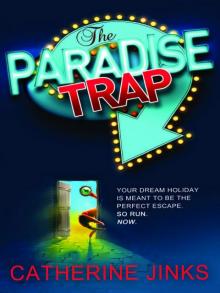 The Paradise Trap
The Paradise Trap A Very Singular Guild
A Very Singular Guild Eloise
Eloise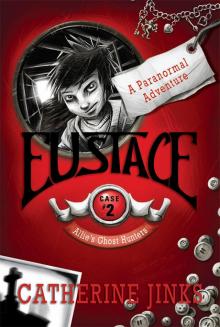 Eustace
Eustace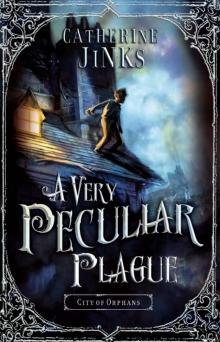 A Very Peculiar Plague
A Very Peculiar Plague Pagan's Crusade
Pagan's Crusade The Gentleman's Garden
The Gentleman's Garden Pagan's Vows
Pagan's Vows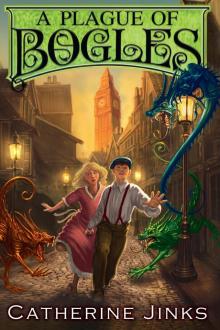 A Plague of Bogles
A Plague of Bogles The Secret Familiar
The Secret Familiar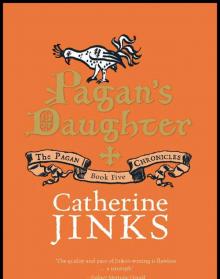 Pagan's Daughter
Pagan's Daughter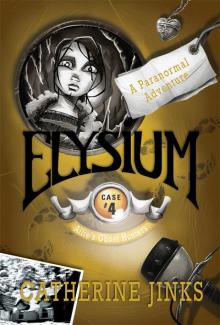 Elysium
Elysium The Reformed Vampire Support Group
The Reformed Vampire Support Group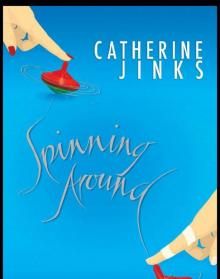 Spinning Around
Spinning Around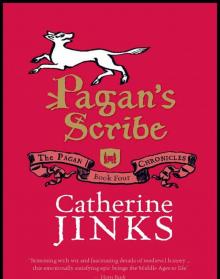 Pagan's Scribe
Pagan's Scribe Evil Genius
Evil Genius Pagan in Exile
Pagan in Exile Shepherd
Shepherd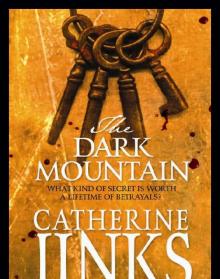 The Dark Mountain
The Dark Mountain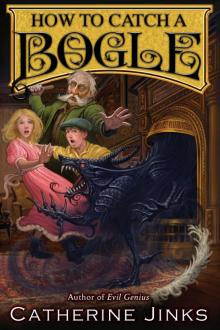 How to Catch a Bogle
How to Catch a Bogle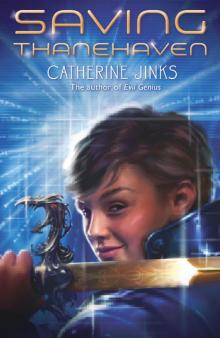 Saving Thanehaven
Saving Thanehaven The Genius Wars
The Genius Wars The Abused Werewolf Rescue Group
The Abused Werewolf Rescue Group Theophilus Grey and the Traitor's Mask
Theophilus Grey and the Traitor's Mask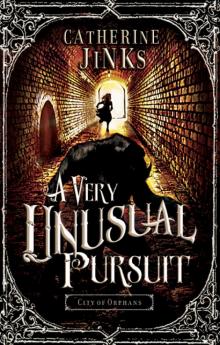 A Very Unusual Pursuit
A Very Unusual Pursuit Genius Squad
Genius Squad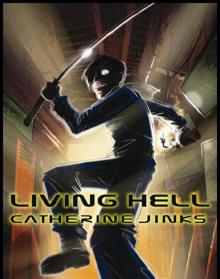 Living Hell
Living Hell The Road
The Road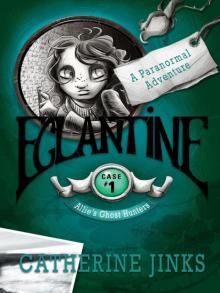 Eglantine
Eglantine